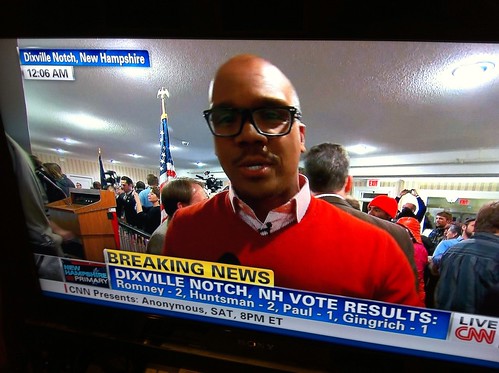President Obama yesterday exercised his “recess appointment” powers to appoint Richard Cordray, whose nomination had previously been blocked by the Senate GOP, as the head of the newly created Consumer Financial Protection Bureau.
There’s only one problem with this: Congress isn’t in recess.
Congressional Republicans have ensured that Congress technically remains “in session” throughout the winter break by holding brief pro forma sessions every few days, precisely to prevent Obama from making recess appointments. This action is arguably outside the spirit of the rules regarding congressional recesses and presidential recess appointments, but it’s within the letter of those rules — or at least, it was widely acknowledged until now to be within the letter of those rules, including by Senator Obama and other Senate Democrats who pulled this exact same stunt to prevent President Bush from making recess appointments late in his term. Unless I’m very much mistaken, Bush never reacted to this gambit by pretending Congress was in “recess” when it was actually still in session. Bush made recess appointments, yes, but only when Congress was actually in recess.
Now, as President Obama would say, let me be clear. Senate Republicans should not be blocking nominees willy-nilly, and especially should not be blocking the appointment of the head of a new agency simply because, in essence, they don’t think the agency should exist. They lost that legislative fight, the agency does exist, and if the GOP wants to change that, they need to pass a law eliminating the agency. In the mean time, the president should have the right to appoint people to fill the vacancies in the new agency, and so long as those people are basically qualified and competent and not drastically outside the political mainstream, they should be confirmed. Of course, both parties have been flagrantly violating that principle for years now, but that’s how it should be. Moreover, I’d say there’s something particularly subversive about undermining recently passed Acts of Congress by stonewalling the nominees necessary to allow the newly created agency to function. So in that sense, the Republicans are, in my view, clearly in the wrong on Cordray.
But two wrongs don’t make a right, especially when the second wrong is an possibly unconstitutional, “unprecedented power grab,” as John Boehener put it. And it’s made worse by Obama’s stated rationale, which is political rather than consitutional:
But when Congress refuses to act, and as a result, hurts our economy and puts our people at risk, then I have an obligation as President to do what I can without them. (Applause.) I’ve got an obligation to act on behalf of the American people. And I’m not going to stand by while a minority in the Senate puts party ideology ahead of the people that we were elected to serve. (Applause.) Not with so much at stake, not at this make-or-break moment for middle-class Americans. We’re not going to let that happen. (Applause.)
That’s not a legal or constitutional argument, it’s a populist rallying cry — and in this context, I’d call it demagoguery. It brings to mind, for me, this exchange from A Man For All Seasons:
Alice: Arrest him!
Thomas: Why, what has he done?
Margaret: He’s bad!
Thomas: There is no law against that.
Richard: There is! God’s law!
Thomas: Then God can arrest him.
Alice: While you talk, he’s gone!
Thomas: And go he should, if he was the Devil himself, until he broke the law!
Richard: So now you’d give the Devil benefit of law!
Thomas: Yes. What would you do? Cut a great road through the law to get after the Devil?
Richard: I’d cut down every law in England to do that!
Thomas: Oh? And when the last law was down, and the Devil turned ’round on you, where would you hide, Roper, the laws all being flat? This country’s planted thick with laws from coast to coast -– man’s laws, not God’s -– and if you cut them down — and you’re just the man to do it — do you really think you could stand upright in the winds that would blow then? Yes, I’d give the Devil benefit of law, for my own safety’s sake.
Obviously, I’m not saying that Republicans are the Devil, or that President Obama or Richard Cordray or the CFPB is God. Nor am I suggesting that this one action by Obama will single-handedly destroy American government, nor that the Obama Administration is a “lawless” regime, as some on the Right are hyperbolically claiming. As “constitutional crises” go, this is a relatively minor one. It’s not even totally clear to me that the Constitution, as opposed to decades of informal precedent regarding the interpretation of the Constitution, has been violated.
But even if it’s “only” decades of informal constitutional precedent that have been violated, that violation — for explicitly political reasons, supported by populist rhetoric — is still wrong, no matter how much the GOP is also wrong (in a more pedestrian, everyday political sense) to have blocked the Cordray nomination in the first place. And to defend a legal or constitutional wrong with populist political rhetoric is, arguably, even worse. That’s dangerous. That way lies true lawlessness, crisis and authoritarianism. It’s a long, long way down the road — but that’s the direction the road leads. And Obama shouldn’t be leading us in that direction, no matter how frustrating the GOP’s tactics are.
Moreover, even if you don’t buy the argument that this move is structurally wrong in a manner that infringes upon separation of powers and whatnot, it’s still politically unwise and short-sighted. Just as with the breakdown of the old way of handling judicial and other appointments, just as with the ever increasing abuse of the filibuster, just as with the questionable (but legal) tactic of holding brief “sessions” to prevent recess appointments from ever happening, one party breaking the rules (or the spirit thereof) will embolden the other party to do exactly the same thing when they’re in power. Do the Democrats really believe President Romney in 2013, or President Christie in 2017, won’t do exactly the same thing President Obama is doing now? The Democrats just gave away, forever, their power to block recess appointments by Republican presidents — all to get Richard Cordray in office. Was it worth it? Really? Another Man for All Seasons quote comes to mind:
It profits a man nothing to give his soul for the whole world … but for the Consumer Financial Protection Bureau?
In my view, as a generally Obama-supportive centrist, the president has two choices. He must either acknowledge his error and retract the recess appointment, or he must convincingly explain his legal and constitutional (not political) rationale for this move, and do so in a way that either harmonises his action with past precedent or explains why he now believes that precedent, which he previously supported, should be cast aside.
If he does neither, as will likely be the case, then he is and will remain in the wrong on this. It’s not the most grievous abuse of power in presidential history; indeed it probably doesn’t even make the “others receiving votes” category of the rankings thereof. But it’s wrong, and it’s dangerous, and fair-minded liberals should condemn it.









